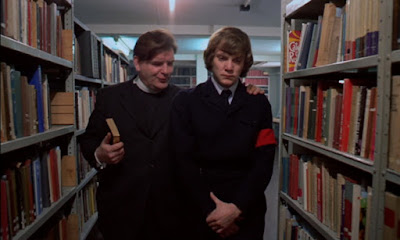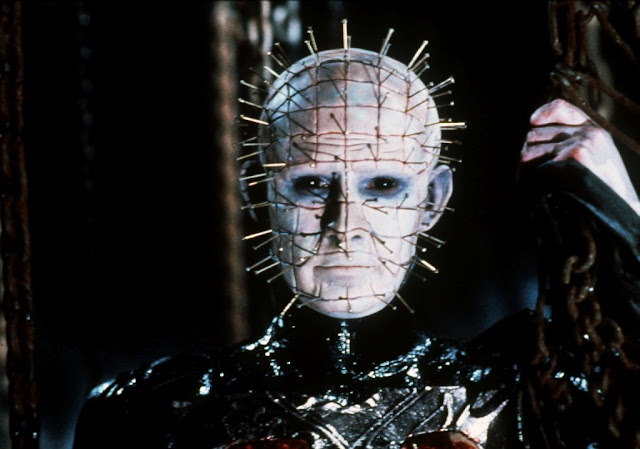Throwback Thursday Retrospective: A Clockwork Orange
"When a man cannot choose, he ceases to be a man", words espoused by this chaplain during Alex's reformation period in the classic Stanley Kubrick film, A Clockwork Orange. It is this line that I think really carries the heaviest weight of the moral messages portrayed throughout this masterpiece film. Film can be measured in a lot of ways, but I believe the most important piece to any good work is that the story is timeless. That is to say it doesn't rely on cliches that will no longer exist, or plot points that will not remain relevant beyond a decade later. I think that truly very few films have stood the test of time as well as this one. That brings me back to the line that the pastor spoke to Alex, freedom to choose. Are we entitled to choose whether we are good or bad, whether we are evil, criminal, whatever you want to label it. And, also, what happens when that choice is taken from us, what kind of effect it has on our psychology. If you are conditioned to be good, can you truly say you are good. These are the themes central to A Clockwork Orange, and we will be exploring them in this retrospective. Now if you're unfamiliar with the film, here's a quick rundown of what it's all about.
The story centers on a delinquent youth named Alex and his gang of friends he calls "droogs." They commit all sorts of petty crimes and other criminal acts such as rape, without much thought of the consequences of their actions thereof. Essentially they're just a bunch of misunderstood teens who are lashing out at their oppressive society. Alex has a probation officer, like most criminal juveniles, who tries to steer him clear of his destructive life choices. Of course, Alex doesn't listen, and in a scene not much later in the film accidentally murders someone. He's sentenced, and during his time in prison he learns of a therapy that will get him out faster. It's then that the line from the beginning is spoken, and Alex ignores the chaplain's warning about being free to choose goodness.
The rehabilitation process begins, they give him a strange medication with no explanation and strap him in to subject him to video's of crimes he would commit in real life. He finds them nauseating, instead of enjoyable, and what's worse, they contain his favorite song Ludwig Von Beethoven's 9th symphony in the background. After he passes through this process and is deemed "cured" by the ministry, he is let out into society a "free" man. He visits some of his old hangouts and runs into his old gang who are now policemen, they then take him out and beat him viciously for being mean to them for so many years. It's clear that by this point Alex is now a full outcast, and no one is really on his side anymore, as he's been abandoned by nearly everyone he thought was close to him, even his own parents. To make matters worse, his droogs from the old gang drop him off on the doorstep of the very same house his droogs tormented and had their way with an elderly man's wife in not long ago. The man finds out, calls his writing friends to find information about Alex's treatment out, and then uses it to torment the young man with his favorite song. Alex is driven to commit suicide by jumping out the window, but awakes in a hospital safe, but banged up. The papers are saying the Ministry is evil and Alex was tortured, so the Ministry tells him to be a good kid and not say anything bad about them, and then everything will go back to normal. As a sign of goodwill, they play his favorite song and he's happy as can be to find out it no longer makes him nauseous and suicidal. He was cured all right!
So, now that the rundown is out of the way, what does this film say about personal choice and the freedom of having it? I'd say it says a heck of a lot about that really. Alex is no different from any of the troubled youth living in our country today. He's a relate-able character because any troubled youth has the chance of getting caught up in gangs, and criminal activities. The movie shows his personality is not really that of a psychopath, but someone who is simply misunderstood and seems to be using that misunderstanding as a catalyst for crime. His droogs want equality, they want to be able to do the mad things they do, and in their world they can get away with a lot of it with no consequence. Petty crimes happen all the time in our world, and it's no different in the world of this film. There is one sequence where Alex shows some humanity and less evil intent, wherein he invites two willing women to his home to have some consensual fun. I think in a way this serves to point out that Alex does not rape women because he can not have them on their own accord, but simply does it because violence is something he likes or is conditioned to like. In the beginning of the film he mentions they're drinking milk laced with a drug that heightens their senses for "ultra violence". Is it really that Alex is a bad child, or is he conditioned to be one? The society around him is failing, his family doesn't love him, and he isn't good in school, so what does he have to do other than commit crimes? And then, after his reformation, he can no longer choose to be immoral. He can't even think about sex, violence, or anything negative without an immediate and crippling aversion to the thought. This I think is the crux of the moral themes explored within the film, it is after Alex's therapy that the themes presented through the film truly begin to show. The themes about freedom of moral choice and being allowed to choose goodness.
Alex is left by the government to wander the streets as some sort of test subject experiment that went wrong. His mind is a prison in itself, as he can not freely think of anything considered morally objectionable by society at large. Just the thought of such things will drive him to consider suicide, a tool that could easily be used by totalitarian governments to suck the life out of the people. It's a dark thought, turning young free people into drones that follow all the established laws and rules and have no sense of moral ambiguity. They know what is right, and what is wrong, and they will never do what is wrong because it will make them kill themselves. This kind of reprogramming of the mind would be dangerous and deadly to a society, and it's that kind of therapy that is central to the story of Alex's life. The author of the original novel, Anthony Burgess, is a widely known critic of this kind of rehabilitation therapy which is known as aversion therapy, albeit his version of it is more dystopian in nature. Conditioning youth to always be good and never think of anything that is deemed wrong is both an immoral and inhumane thing to do, because we are all entitled to that basic freedom. There is no reason our thoughts should be policed, when we can not choose we cease to be free, we cease to be human in essence. Alex is a criminal by nature, it is shown in the end, it's made clear throughout the film. Who are we to stop his nature? Who are we to take that freedom from him? We are only human ourselves, with all our flaws and imperfections, so who are we to make that choice for him. Goodness can't be taught, conditioned, or drilled into someone, it comes from within your body, mind and soul. Once Alex is free of the therapies adverse affect, he falls right back into the same life of crime he was in before, having learned nothing from the therapy. It's a poignant statement on goodness, and the fact that we simply can not be conditioned to be decent human beings, we have to choose that kind of life.
The story of Alex's crime and rehabilitation process is still as relevant to this day as it was when the film originally hit theaters all the way back in 1971. We still argue over whether or not we should be allowed to have choice over what we do. We argue over basic freedoms, basic laws, and basic moral standards constantly. The film presents to us the story of a criminal being "cured" by institutionalized rehabilitation, which could still happen to this day. A form of therapy that strips us of humanity and choice, something that is still a fear on our minds to this day. In a world where government regulation seems to be an every day conversation, I think films like this are even more relevant than they ever have been, and this particular film will always have meaning relative to our society at large. Thank you for reading this retrospective, if you want more stuff like this, subscribe to the blog! And feel free to comment below and talk about the film with me!



Comments
Post a Comment
Please, remember that everyone is entitled to their own opinion, so let's remain civil in the comments section. That's the only request I have.